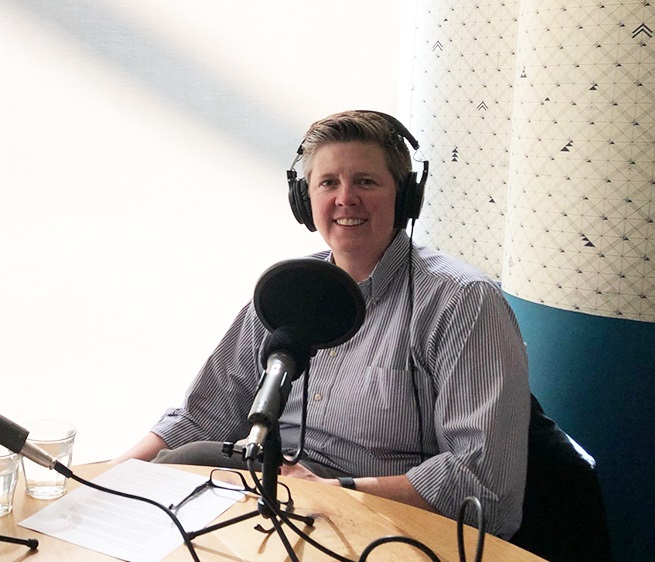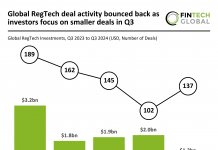Aldermore Bank’s chief information security officer reveals what it is like to be a woman in the cybersecurity space and discusses the launch of an initiative to tackle its lack of diversity.
The technology sector is rife with sexism and a lack of diversity, with women having been reported as holding only a quarter of all tech roles in the UK. That is also true for the cybersecurity sector. “I just sat in a room the other day with 20 other blokes around a table and realized, ‘Hey, I’m the only lady at the table here,’” Becky Pinkard, chief information security officer at Aldermore Bank, recently told FinTech Global. The interview was made as part of FinTech Global’s new podcast series called Women Leaders in Finance.
And she is not the only one who have noticed it. During conversations with other women in the cybersecurity sector, she has heard about women getting “asked silly questions like, ‘Oh, who are you at this conference with,’ ‘Where is your boyfriend, dear,’ or ‘What does your husband do?’” she said. “I’ve talked with and heard experiences from [people] who’ve been hit on in inappropriate places.”
While she says she has not experienced that kind of unsuitable behaviour herself, Pinkard has still faced challenges because of her gender. “I don’t fit the heteronormative standard for women,” she says. “For those of you that have never met me and haven’t seen me, I’m almost six feet tall, got very short hair, don’t wear makeup. So, you know, most folks that I meet within business environments, [they] don’t quite know what bucket to put me into. So I think that I’ve faced maybe some different challenges than other women that do fit more into a heteronormative standard of looks and appearance and immediate biases that get applied.”
This is something that she is trying to change both in her current role and as the co-founder of the initiative WEDS – We Empower Diverse Startups. “One of the things that you know, we’re really working to do is help people understand what can you do to bring more diversity into organizations all the way from startup size and up,” she said.
Pinkard argued that companies can do one seemingly simple thing to ensure a boost in diversity. “One of the best pieces of advice that I’ve heard so far is simply to put the welcome mat out,” she said.
With that, Pinkard means that people should make it clear in everything from their job specs to their websites that the company is open to everyone, no matter what gender or background they might have.
That also means being aware of and being able to deal with any unconscious bias that could prevent job candidates from being judged by criteria that does not matter. “[Make sure] they’re being evaluated on the merit [of their] skills and the capabilities they bring into the organization,” Pinkard argued. “Not the colour of their skin, not their mental capacities in terms of differences for neurodiversity [or sexual orientation, religious background. [None] of that should matter.”
Another important way for fighting sexism and empowering women in cybersecurity is to encourage open conversations and support. That includes senior professionals like Pinkard herself being willing to mentor women in the sector. She has certainly benefitted from that herself throughout her career.
Pinkard had been part of the industry for almost two decades. However, speaking with FinTech Global, she revealed that she fell into the sector almost by accident after finishing her studies at Texas A&M University in 1994. “Basically I got out of uni with a psychology degree and didn’t really know what I was going to do with that,” she recalled. “So I worked for a little while, doing some odd jobs and things and I sort of stumbled into security through a help desk job.”
The experience made her realize that there were some security issues related to her desk, which ignited her interest in the industry. “And for me, that was the start to my security career,” she says.
Having decided to become a security professional, Pinkard embarked on what she describes as “a more technical route than I’m on right now” and figure out different ways she could learn about security.
Although, that would prove a bit of a challenge. “This was like ’97, ’98,” Pinkard remembered. “We didn’t have the amazing internet that we have now [or the online] university courses that we have now.” Eventually, she stumbled upon the SANS Institute, the security research and education organization. “For me that was just an eye opening experience [to take part of] the training courses that they had and [engage with the] teachers that they had,” Pinkard recalled.
During this time she also built her own lab at home to test malware, tried to configure things “and just did a lot of crazy stuff and had a lot of fun doing it.”
For the next decade she would jump into any role that looked interesting “without any rhyme or reason” until she finally decided to “knuckle down and get a bit more serious,” she told FinTech Global. “I started to meet some women that were doing really well and tried to figure out how I could leverage a mentorship.”
Through this, she got introduced to a group called the Executive Women’s Forum in the States. “I met a lady by the name of Rhonda McLean who became the CSO at Barclays and then that’s what helped me get a job at Barclays,” she stated.
Having then decided to take the role and move to England from the US, she spent the next ten years becoming more decisive about the kind of roles she would jump into. Part of the reason was that she had realised that she wanted to become a CSO herself one day.
Her ambition has taken her on a journey that has seen her take on roles at education company Pearson and at the innovative security company Digital Shadows before landing her top job at Aldermore Bank in May 2019.
Given the impact mentoring and networking with other women has had on her career, she is now encouraging other women in the cybersecurity sector to seek out the advice from others in the sector. “Networks have been everything for me,” she said. “I mean, I’ve gotten some fantastic jobs and opportunities because of networks that I have become part of or, inadvertently, created through organizations I’ve been involved with and the people I’ve met on that journey.”
That being said, Pinkard has noted that things look to be changing. “I think there are age old stereotypes that have held women back in a lot of ways,” she said, “and it feels amazing to be present in this time and space because it feels like, you know, we’re inspecting these shackles and we’re breaking away from them and we’re forming ourselves, men and women across all different types of ethnicities and abilities and we’re forming ourselves into, you know, [not being afraid of saying], ‘This is me, this is who I am. And by Gosh, I’m going to get a seat at that table.’ And that’s encouraging to see.”
And as she is seeing more and more women joining the sector, Pinkard is encouraging them to don’t be afraid to ask questions. “I’ve never been afraid to approach someone and ask, you know, hey, do you have mentoring advice from me or could you be a mentor for me?” she said. “And likewise, I always encouraged people, you know, if they want to have a mentoring conversation to, to have a chat to me as well.”
Pinkard is a speaker at FinTech Global’s Financial Services CyberTech Forum on September 24. This interview was part of FinTech Global’s new weekly podcast series called Women Leaders in Finance. To listen to the full episode and other insightful interviews, just click on the link.
Copyright © 2019 FinTech Global











